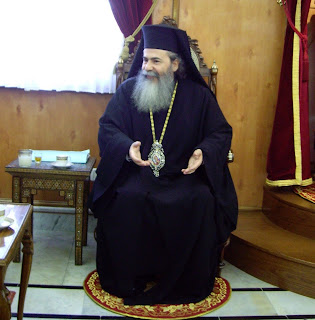
Today was, for me, intellectually enriching but psychologically exhausting as our delegation listened to the perspectives of various key players addressing conflict in the Israel-Palestinian community. So much took place today that it will take several blog posts to do justice to what we learned.
Our first meeting was a short devotion by Rev Gregor Henderson, who read Psalm 122 and reflected on that famous Jewish psalm's references to peace and security in Jerusalem. Then we walked from our hotel up the street and around the corner to the Greek Patriarchate, where we had an audience with His Beatitude Patriarch Theophilos III, Greek Orthodox Patriarch of Jerusalem (pictured, in discussion with us this morning).
His Beatitude described the situation in Jerusalem as "polarization," with three major faiths regarding important historical sites as holy. He suggested that the Christians ought to be optimistic, characherised by "tolerance, reconciliation and love," shaped by the gospel which is selfless and unconditional. Reflecting his Eastern tradition, he claimed that without holy places of liturgy the church is nothing; "Jerusalem has to remain as it is, accessible to all religions, so that all can experience the tangibility (not the unity) of all the religions. He viewed Jerusalem as a paradox, a city of both blessing and cursing. He spoke at length on the employment prospects of Palestinian Christians, and expressed hope for a peaceful future, but said we should not expect miracles overnight.
As we discussed these issues, we were joined by three bishops, and were served cognac, fruit juices, and Turkish coffee, accompanied by sweets and chocolates. His Beatitude graciously gave each of us a magnificent large illustrated book titled Byzantine Illuminated Manuscripts of the Patriarch of Jerusalem, and several smaller gifts. In return, our delegation presented him with a book of writings from the Society of Friends (Quakers), titled This We Can Say, and a bottle of red Australian wine. His Beatitude appeared to me to be learned, diplomatic and politically astute, all good qualities for a religious leader of international status.
Our first meeting was a short devotion by Rev Gregor Henderson, who read Psalm 122 and reflected on that famous Jewish psalm's references to peace and security in Jerusalem. Then we walked from our hotel up the street and around the corner to the Greek Patriarchate, where we had an audience with His Beatitude Patriarch Theophilos III, Greek Orthodox Patriarch of Jerusalem (pictured, in discussion with us this morning).
His Beatitude described the situation in Jerusalem as "polarization," with three major faiths regarding important historical sites as holy. He suggested that the Christians ought to be optimistic, characherised by "tolerance, reconciliation and love," shaped by the gospel which is selfless and unconditional. Reflecting his Eastern tradition, he claimed that without holy places of liturgy the church is nothing; "Jerusalem has to remain as it is, accessible to all religions, so that all can experience the tangibility (not the unity) of all the religions. He viewed Jerusalem as a paradox, a city of both blessing and cursing. He spoke at length on the employment prospects of Palestinian Christians, and expressed hope for a peaceful future, but said we should not expect miracles overnight.
As we discussed these issues, we were joined by three bishops, and were served cognac, fruit juices, and Turkish coffee, accompanied by sweets and chocolates. His Beatitude graciously gave each of us a magnificent large illustrated book titled Byzantine Illuminated Manuscripts of the Patriarch of Jerusalem, and several smaller gifts. In return, our delegation presented him with a book of writings from the Society of Friends (Quakers), titled This We Can Say, and a bottle of red Australian wine. His Beatitude appeared to me to be learned, diplomatic and politically astute, all good qualities for a religious leader of international status.

No comments:
Post a Comment